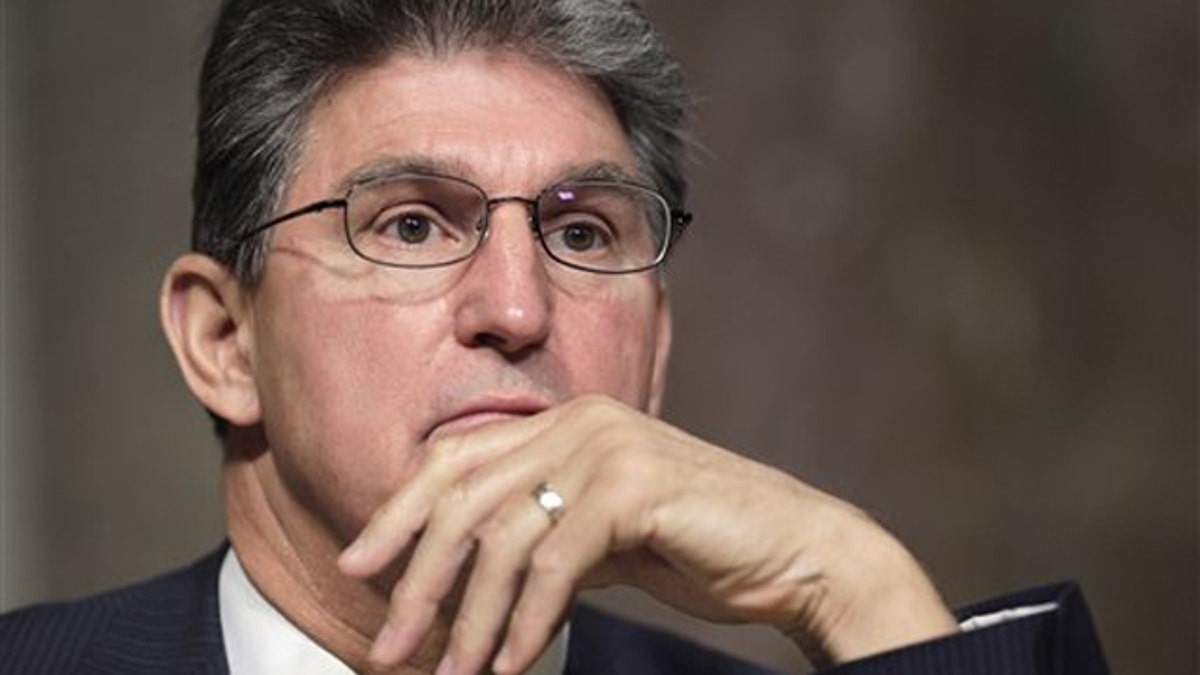
Sen. Joe Manchin listens to testimony on Capitol Hill March 29 during a hearing on Libya. (AP)
With Congress headed for a shutdown unless a spending deal is reached, lawmakers are trying to make this failure of governance seem a tad less offensive to everyday Americans by vowing to give back part of their $174,000 paychecks.
The fact that hundreds of thousands of federal workers could be furloughed while, by law, the members of Congress who caused the problem would continue to get paid is a cruel twist in the mechanics of a shutdown. In response, lawmakers have floated several ideas for docking their own pay.
Rep. Darrell Issa, R-Calif., who is independently wealthy, told Fox News he already gives his salary away to charity. But regardless of economic station, he urged his colleagues to follow suit and turn away their paychecks if the government shuts down.
"Members should not be saying, 'Well, I need my money when in fact other federal workers aren't getting it," Issa said.
Sen. Mark Warner, D-Va. -- who also is a millionaire, though he accepts a congressional paycheck -- plans to either decline pay or donate it to charity if there's a shutdown, a spokesman told FoxNews.com.
Rep. Michele Bachmann, R-Minn., said she will donate her pay to a nonprofit serving military families.
Sen. Joe Manchin, D-W.Va., made a similar pledge, passing around a letter to colleagues Thursday urging them to join him in returning their paychecks.
"The bottom line is this: I can't imagine that the President, Vice President or any Member of Congress -- Republican or Democrat -- thinks they should get paid when the government has shut down," Manchin wrote.
Not everyone's signing on.
On the House side, Rep. Linda Sanchez, D-Calif., told MSNBC she can't afford it.
"I have to tell you that I live paycheck to paycheck, like most Americans," she said, explaining that she has student loans, a 2-year-old son and residences on both coasts. "It's very difficult for me to say, 'Hey, I can give up my paycheck,' because the reality is, I have financial obligations that I have to meet on a month-to-month basis that doesn't make it possible for me.
"Now if you're a member of Congress who is a millionaire, and there are quite a few members of the House and Senate that are, it's really not a problem for them," she added.
Some lawmakers have tried to require that members of Congress don't get paid in the event of a shutdown.
"They shouldn't be getting paid. Just like federal employees shouldn't be getting paid," House Speaker John Boehner told ABC News.
But there are political and constitutional hurdles.
The Senate already passed a Democrat-authored bill to block congressional salaries last month. But the House did not follow.
"If Speaker Boehner were really serious about preventing members of Congress from being paid during a government shutdown, he would immediately pass our 'no budget, no pay' bill," Sen. Barbara Boxer, D-Calif., said in a statement Thursday.
Yet Democrats also will not take up a Republican version of the congressional no-pay bill -- one which was connected to a House budget bill cutting $61 billion which Democrats roundly oppose.
Not only will neither chamber pass the other's no-pay bill, but the 27th Amendment to the Constitution provides that laws changing congressional pay don't take effect until the following term.
Issa noted this concern, as did Sen. Christopher Coons, D-Del. But Coons said the Constitution wouldn't prevent lawmakers from volunteering to give up their pay.
"There is a constitutional issue here. We might have to voluntarily give back our pay in the event of a shutdown. But I think the pain here ought to be spread broadly," Coons told Fox News. "The average folks out there watching this ought to know that we in Washington get it, that a shutdown is an embarrassing failure on our part to do the job we were hired to come here and do."
Dan Weiser, spokesman for the chief administrative officer of the House, said members of Congress have to receive their paychecks by law, but that, if they don't give them to charity, they can also use them to pay down the national debt. However, The Washington Post reported last month that just a few lawmakers have gotten in the habit of doing that, and that donations from Congress to the debt totaled just $15,000 in 2010.
Meanwhile, the Obama administration is urging Congress to make sure federal workers get back-pay in the event of a shutdown, even though they would not be paid during the shutdown itself.
Jeffrey Zients, deputy director in the White House Office of Management and Budget, noted that furloughed employees were ultimately paid retroactively following the 1995 shutdown, and urged Congress to make sure they are reimbursed should the government shut down this weekend.




